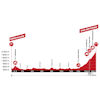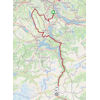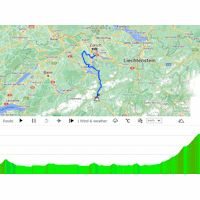Tour de Suisse 2024 Route stage 4: Rüschlikon - Gotthard Pass
 Wednesday 12 June - On the fourth day of the Tour de Suisse, the riders travel from Rüschlikon to a mountain top finish at the Gotthard Pass. The elevation gain of the 171 kilometres route adds up to 3,551 metres, while the last 21.1 kilometres are averaging 5.6%.
Wednesday 12 June - On the fourth day of the Tour de Suisse, the riders travel from Rüschlikon to a mountain top finish at the Gotthard Pass. The elevation gain of the 171 kilometres route adds up to 3,551 metres, while the last 21.1 kilometres are averaging 5.6%.
Most of the elevation gain is saved for the long haul up the mighty Gotthard Pass, although the route starts out on an ascent as well. The riders climb the Albis Pass from the start, accounting for 5.1 kilometres at a 5.9% gradient. It is actually the same ascent that ended the 2nd stage.
The Tour de Suisse then continues on gently rolling terrain, first in a northerly direction and then to the south.
From Silenen onwards, with 36 kilometres remaining, the route goes virtually entirely uphill. The gradients kick up after Wassen when the route rises at 6.7% over the following 7.9 kilometres. In this section, the riders pass through the enchanting Schöllenen Gorge.
At the end of the climb, in Andermatt, the gradients even out for 3 kilometres, only to go up again for the last 10.1 kilometres. The final haul up the Gotthard Pass features an average gradient of 6.3%.
Five years ago, the Tour de Suisse last finished at the Gotthard Pass, and it was Egan Bernal who climbed to victory that day. It was a different approach, though, as the riders came from Biasca, on the other side of the mountain.
Starting at kilometre 159.2, the Golden Kilometre offers two opportunities to gain time bonuses of 3, 2, and 1 seconds. The first three riders at the finish line take 10, 6, and 4 seconds.
Ride the route yourself? Download GPX 4th stage 2024 Tour de Suisse.
Another interesting read: results 5th stage 2024 Tour de Suisse.
Tour de Suisse 2024 stage 4: route, profile, more
Click on the images to zoom
Watch the highlights of recent races here:
Leave a comment
No comments yet, your opinion is most welcome.
Related articles GC Favourites - Tour de Suisse 2024 Overview - Tour de Suisse 2024 Winners and records - Tour de Suisse Almeida wins time trial, Yates seals GC - Tour de Suisse 2024 Stage 8: Start times ITT - Tour de Suisse 2024 Yates-Almeida duo reigns in Switzerland - Tour de Suisse 2024 Almeida wins mini mountain stage, Yates still leader - Tour de Suisse 2024 Yates cements lead with uphill triumph - Tour de Suisse 2024 Nys wins at punchy finish, Bettiol new leader - Tour de Suisse 2024 Coquard wins decimated peloton sprint, Lampaert still leader - Tour de Suisse 2024 Lampaert storms to leader's jersey in mini ITT - Tour de Suisse 2024 Route stage 1: Vaduz - Vaduz - Tour de Suisse 2024 Route stage 2: Vaduz - Regensdorf - Tour de Suisse 2024 Route stage 3: Steinmaur - Rüschlikon - Tour de Suisse 2024 Route stage 5: Ambri - Carì - Tour de Suisse 2024 Route stage 6: Ulrichen - Blatten - Tour de Suisse 2024 Route stage 7: Villars-sur-Olon - Villars-sur-Olon - Tour de Suisse 2024 More articles Summer Olympics 2024 Paris: Route ITT (m/w)
Summer Olympics 2024 Paris: Start list + times ITT – men
Summer Olympics 2024 Paris: Start list + times ITT – women
Summer Olympics 2024 Paris: Route road race – men
Summer Olympics 2024 Paris: Riders road race – men
Summer Olympics 2024 Paris: Route road race – women
Summer Olympics 2024 Paris: Riders road race – women
Clásica de San Sebastián 2024: The Route
Tour de France Femmes 2024: The Route
Tour de France Femmes 2024 Route stage 1: Rotterdam - The Hague
Tour de France Femmes 2024 Route stage 2: Dordrecht - Rotterdam
Tour de France Femmes 2024 Route stage 3: Rotterdam ITT
Tour de France Femmes 2024 Route stage 4: Valkenburg - Liège
Tour de France Femmes 2024 Route stage 5: Bastogne - Amnéville
Tour de France Femmes 2024 Route stage 6: Remiremont - Morteau
Tour de France Femmes 2024 Route stage 7: Champagnole - Grand-Bornand
Tour de France Femmes 2024 Route stage 8: Grand-Bornand - Alpe d'Huez
Vuelta 2024: The Route
Vuelta 2024: Riders
Vuelta 2024 Route stage 1: Lisbon - Oeiras
Vuelta 2024 Route stage 2: Cascais - Ourém
Vuelta 2024 Route stage 3: Lousã - Castelo Branco
Vuelta 2024 Route stage 4: Plasencia - Pico Pitolero
Vuelta 2024 Route stage 5: Fuente del Maestre - Seville
Vuelta 2024 Route stage 6: Jerez de la Frontera - Yunquera
Vuelta 2024 Route stage 7: Archidona – Córdoba
Cycling Calendar 2024
Tour de France 2024: Withdrawals




